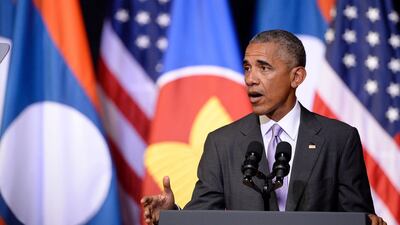Not since the days of the late Russian president Boris Yeltsin, who once startled the world by publicly playing the spoons on the bald pate of Askar Akayev, the president of Kyrgyzstan, has an international leader so delighted in upsetting diplomatic niceties.
President Obama was due to have talks at the East Asia Summit in Laos this week with Rodrigo Duterte, the new leader of the Philippines. He had second thoughts, however, after the bracingly frank Mr Duterte called him a “son of a whore”. Mr Obama swiftly decided he’d rather meet South Korea’s president instead.
But this has not been the US president’s only snub on what ought to have been a valedictory tour of a region that is supposed to represent his greatest foreign policy success: the “pivot to Asia”.
Arriving for the G20 in China over the weekend he suffered what might be referred to as a “red carpet malfunction” when he had to descend not to a grand ceremonial committee but from a small staircase in the belly of the plane, while his national security adviser, Susan Rice, was hassled by officials.
The time and attention the first “Pacific president” has paid to the region has been welcomed. But despite some cheerleading by former state officials such as Michael Fuchs, who hailed the pivot as “a historic success” in a recent New Republic essay, there are many who fear that US involvement – and particularly its escalated military presence, with ships in the South China Sea and a forthcoming new missile system in South Korea – has only raised tensions with China, rather than containing or managing its rise.
Meanwhile, the Trans Pacific Partnership trade deal, which according to Daniel Russel, assistant secretary of state for Asia, was supposed to fulfil “the strategic promise of the rebalance, as a system that integrates the US with the Asian-Pacific region”, is on life support. With both presidential candidates opposed, it looks increasingly unlikely to pass or even be put to Congress.
Its European equivalent, the Transatlantic Trade and Investment Partnership, is even less likely to get off the ground, with the French and Germans saying that talks this year have failed and casting doubt on whether an agreement could ever be reached.
All of which makes one ask: is the legacy of the Obama presidency to be solely one of disappointment?
In terms of the rest of the world, the answer appears to be yes. Mr Obama deserves some credit for the Iranian nuclear deal; although it is worth noting that it upset long-standing US allies in the region while still failing to satisfy the regime in Tehran, which is making increasingly noisy complaints about it.
He has also been right to stand up to – which means no more than not to acquiesce to every single demand from – the ever more belligerent government of Benjamin Netanyahu.But the hope and optimism of Mr Obama’s Cairo speech in 2009, in which he called for an end to the “cycle of suspicion and discord” between the Muslim world and the West, has long dissipated.
The western intervention in Libya, of which the US was a part, has led to disaster. A confused stance towards Syria, made even worse by declaring a “red line” and then failing to act when it was crossed, may have even prolonged a civil war that shows no sign of resolution and played a huge role in enabling the rise of ISIL.
While “don’t do stupid stuff” may be quite a good dictum to remember when formulating policy of any kind, too often Mr Obama has fallen into the trap of issuing principled judgments, and then failing to follow through with meaningful and effective action. At the same time, unprincipled – and quite possibly illegal – practices, such as drone strikes that kill both the innocent and targets denied any right to trial, continue without seeming to trouble the conscience of the cool law professor in the Oval Office.
US relations with Russia have almost been a masterclass in what not to do.
American officials riled the Kremlin by clearly interfering on its doorstep in Ukraine – remember the leaked conversation in which the state department’s Victoria Nuland declared of the then opposition leader Arseniy Yatseniuk: “Yat’s the guy”? He duly became prime minister. At the same time, however, the US was not prepared to stand up for the country’s pro-western leadership when Russia annexed Crimea.
Put-downs and public antagonism towards Vladimir Putin have done little other than boost the Russian president’s popularity at home, while the pragmatism that might have led to cooperation and improved security in Central Asia and the Middle East has been scorned.
America under Obama has become an unreliable partner abroad. He has appeared torn between a realism that sometimes comes to the fore – with allies in the developing world, security does trump human rights, although it is never openly said – and the insistence that the US should still be “a shining city on a hill”.
Managing imperial decline in an era of the rise and resurgence of other, older powers was never going to be easy. And perhaps it would have been too much to expect any president to openly declare that that is the future America faces.
Failure to do so, and to face up to the cold reality of that fact, however, means that the real legacy of the Obama years is that “hope” can win the presidency.
But hope has ended in disappointment, ultimately because America and its president still think of the US as “the exceptional nation”, but no longer have the capability to justify that self-congratulatory sentiment.
Sholto Byrnes is a senior fellow at the Institute of Strategic and International Studies, Malaysia


